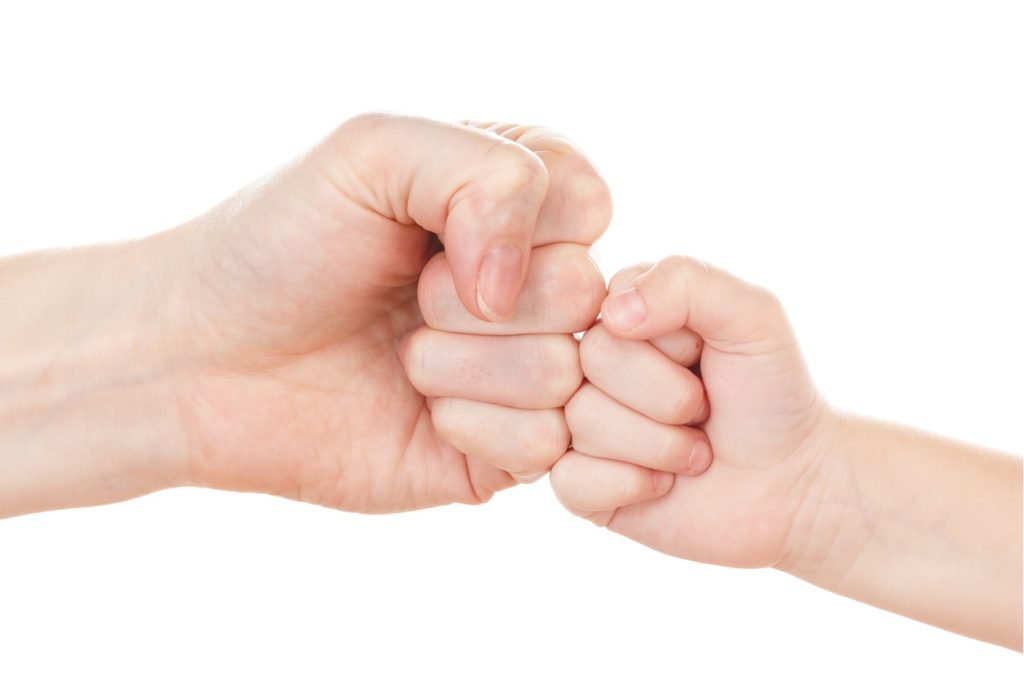When my daughter was a newborn, I developed a simple variant on the popular “5 S’s” sleep method: I would swaddle and gently rock her, preferably while blasting some punk rock. I tested a few different genres, and punk won out. My hypothesis is that it was soothing for a baby who was used to the loud rhythms of life in the womb. Her musical tastes have since broadened, but for the first few weeks of life she heard a lot of the Ramones, as well as the occasional twist, such as the Pogues’ brilliant Irish folk-punk mashup.
The musical selection was a bright spot in a months-long, sleep-deprived blur. Having a baby was the best of times and the worst of times. There were moments of absolute bliss while holding her or watching her sleep, and moments of near-insanity as she woke us up every hour during the night. It was a fulfillment of our most fervent wishes, and it was almost unbearably exhausting. Joy in the morning? Yes, but also more weariness than when we had gone to bed the night before.
The joy was deeper than the pain, both of the physical exhaustion and the grief that had preceded it. After years of infertility, we had given up hope of conceiving a child. Then we found ourselves expecting. Our joy was brief, as our first child died in the womb, a sorrow I wrote about months later here at Public Discourse. Then, within days of my completing and submitting that piece, we found out that we were expecting again. It was wonderful news, but after our heartbreak it was difficult to celebrate without fear. Still, this pregnancy proceeded well enough, with discomforts rather than anguish. And, after the final scare of an emergency C-section, I got to hold my daughter.
There was a convergence of wonders as I sat next to my wife in the operating room, rocking my daughter while the doctors finished the surgery. There was the marvel of modern medical science, which preserved mother and baby from what, for much of human history, would likely have been a lethal delivery. And there was the timeless miracle of meeting a new human life. We knew that there was a new human person growing in the womb—we could feel her kicks and hiccups and, thanks to the achievements of modern science, even visualize her via ultrasound. Yet finally meeting her face to face was still astounding beyond full expression in words.
Start your day with Public Discourse
Sign up and get our daily essays sent straight to your inbox.Such moments are particularly difficult to describe because our language and thoughts have become defined by the mastery of objects, an approach seemingly validated by the triumphs of modern science. But a baby is not a thing or a product. Rather, a baby is a person—an immortal being radiant with transcendence.
The problem with the cliché that a child is a gift is not that it is wrong, but that, because it is a cliché, we often glance past the profundity of its truth.
The language of subjects and objects is especially ill-suited for the attempt to capture the full truth of the person, who always exceeds definition. And yet some of our expressions are more true than we realize. For instance, the problem with the cliché that a child is a gift is not that it is wrong, but that, because it is a cliché, we often glance past the profundity of its truth. The gift of life is inseparable from the givenness of life. We are begotten, not made. Existence is given to us; we cannot preview our life before living it. We cannot decide if life is worth living without living it.
In contrast, we have more control over the circumstances of our children’s lives, and we want the best for their lives. But within the natural and good impulse to care well for our children, there are temptations that diminish the respect owed to their personhood.
Overcontrolling parents are the most familiar manifestation of this. The tropes about these parents are well-worn for a reason. We have all known parents who are overprotective of their children, or who push a child into an insatiable, immiserating ambition or perfectionism. Such attitudes are especially common among educated professionals; we are told to plan our children’s lives carefully, relative to our finances, career, and place in life. There are helicopter parents, and tiger moms, and an extensive array of products promising a competitive edge for the children who use them. But while I am all for playing Mozart to babies, there is something perverse about doing it for cognitive benefits rather than because it is great music—art for college admissions’ sake. Say what you will about punk rock, but at least no one ever played it at children to help them get into Stanford.
Alongside this attitude of competitive child-rearing, we are encouraged to view progeny as products, to be planned for, carefully ordered when desired, and discarded if not up to spec. Biotechnology is knocking on the door of designer children, but the dehumanizing, dystopian ramifications of this mindset are already here. There are the discarded embryos from IVF, the evils of commercial surrogacy, and the abortions of children deemed defective, less desirable, or inconveniently timed.
While I am all for playing Mozart to babies, there is something perverse about doing it for cognitive benefits rather than because it is great music—art for college admissions’ sake. Say what you will about punk rock, but at least no one ever played it at children to help them get into Stanford.
Looming over all of this is the West’s demographic decline, as men and women increasingly forgo coming together to beget and raise children. The connection between this voluntary sterility and the commodification and consumerization of having and raising children is obvious: if children are expensive, people will have fewer of them. Many other trends are also implicated, from the decline of the household as a location of economic productivity to the attenuation of extended family networks. But these material causes are connected to a spiritual crisis.
Excessive efforts to control the givenness of our children’s lives reveal our doubt that life is a good gift in itself. They also show a vision of human flourishing that is dependent upon material prosperity, personal achievements, and social status. These things are good, in their place, but they can easily become idols that divert our attention from that which is best in this life, such as beauty, friendship, and love. People are the point of it all, and the life well-lived is characterized not by an abundance of possessions and accomplishments, but by virtuous living in loving relationships and community.
These relationships, in turn, give us glimpses of a destiny beyond this life. My daughter’s laugh is the most beautiful sound I ever heard—a brief flash of the inexhaustible glory of eternity. More than the good things of this life, what we should desire for ourselves and our children is to have the life of God that transcends death. I want to raise my daughter according to this truth, teaching her that she is of value in herself, regardless of what she does or does not achieve, and that her fullest life and her happiness will be found in God.
One of the most common songs I played to her as a newborn was the Pogues’ “If I Should Fall from Grace with God.”
Heaven forbid.













